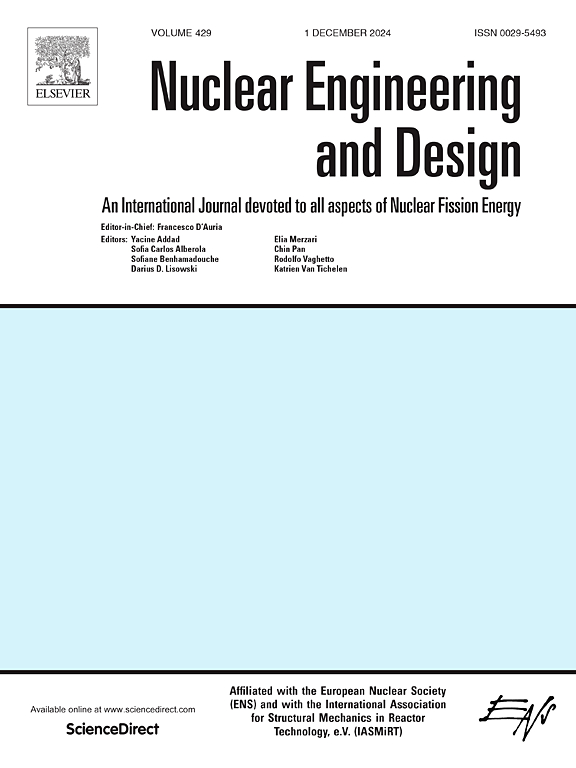Impact of hydrogen on iPWR containment Thermal-Hydraulics in severe accidents
IF 1.9
3区 工程技术
Q1 NUCLEAR SCIENCE & TECHNOLOGY
引用次数: 0
Abstract
Addressing hydrogen issues is an important part of severe accident management for nuclear accidents, and this is doubly important for water-cooled small modular reactors (SMRs), like integral pressurized water reactors (iPWRs). This study uses a combination of containment thermal–hydraulic experiments and modeling to assess the impact of introducing light non-condensable gases under prototypic accident conditions. The experiments evaluated the gas mixing behaviour and steam condensation heat transfer coefficients in the tertiary steam–air-helium system, extending the unified steam condensation correlations by Dehbi (2016) past the density difference transition point. The modeling with the GOTHIC thermal-hydraulics code scaled the experimental observations to reactor-relevant accident scenarios, with steam-hydrogen in a closed containment and steam–air-hydrogen in a loss of containment isolation situation. A strong reduction in the heat transfer capacity caused by the presence of non-condensable gases was observed, which disrupt the steam condensation that drives many of the passive cooling loops that form the basis of accident mitigation strategies. Likewise, the observed gas mixing behaviour inferred that hydrogen combustion may be a further issue that needs to be addressed in severe accident management guidelines.
求助全文
约1分钟内获得全文
求助全文
来源期刊

Nuclear Engineering and Design
工程技术-核科学技术
CiteScore
3.40
自引率
11.80%
发文量
377
审稿时长
5 months
期刊介绍:
Nuclear Engineering and Design covers the wide range of disciplines involved in the engineering, design, safety and construction of nuclear fission reactors. The Editors welcome papers both on applied and innovative aspects and developments in nuclear science and technology.
Fundamentals of Reactor Design include:
• Thermal-Hydraulics and Core Physics
• Safety Analysis, Risk Assessment (PSA)
• Structural and Mechanical Engineering
• Materials Science
• Fuel Behavior and Design
• Structural Plant Design
• Engineering of Reactor Components
• Experiments
Aspects beyond fundamentals of Reactor Design covered:
• Accident Mitigation Measures
• Reactor Control Systems
• Licensing Issues
• Safeguard Engineering
• Economy of Plants
• Reprocessing / Waste Disposal
• Applications of Nuclear Energy
• Maintenance
• Decommissioning
Papers on new reactor ideas and developments (Generation IV reactors) such as inherently safe modular HTRs, High Performance LWRs/HWRs and LMFBs/GFR will be considered; Actinide Burners, Accelerator Driven Systems, Energy Amplifiers and other special designs of power and research reactors and their applications are also encouraged.
 求助内容:
求助内容: 应助结果提醒方式:
应助结果提醒方式:


